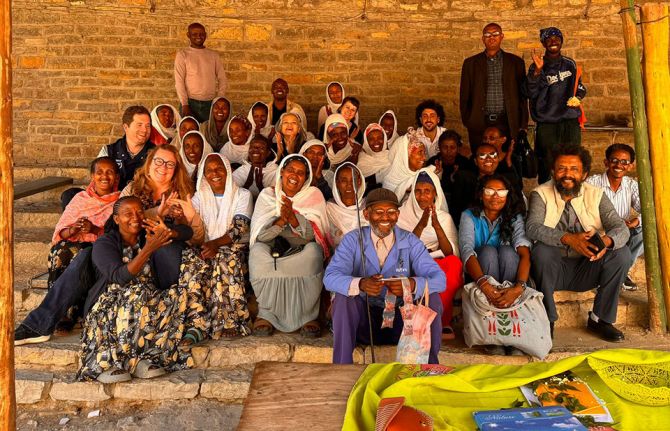
Feature Story
Mogadishu – HIV in a time of unrest
27 July 2012
27 July 2012 27 July 2012
Internally displaced woman with 8 day old baby
Credit: UNAIDS
“I want my child to be born HIV negative”, said Mr Mohamoud Mohamed Ahmed, accompanied by his smiling and visibly pregnant wife, Mrs Nasteho Farah Elmi, at a recent discussion with people living with HIV in Mogadishu. This bullet-ridden, crumbling city has a network of five hundred people living with HIV. Created by the South Central AIDS Commission of Somalia, its proactive Director, Mr Ahmed Mohamed Jimale, solves such concerns by directing women to clinics for the prevention of transmission of HIV from the mother to her unborn child. But, there is much frustration due to lack of funding for such services.
Little is known about HIV in Somalia – and even less so in Mogadishu, security concerns limiting the collection of data. The most recent verifiable data obtained was in 2004. Since then, estimates of 0.7% to 1% prevalence have been assumed. However, analysis of data from Voluntary Counselling and Testing Centres and in Tuberculosis clinics indicate HIV infection rates of up to 18% among people with TB and 5.2% among female sex workers. Throughout Somalia conditions exist for a growing epidemic: increased trade, migration and the sprouting of sex work at borders and ports.
The Minister of Women’s Development and Family Care, Mrs Maryam Aweis Jama, expresses deep concern about the lack of resources: “The Somali government has negligible resources for running the government, leave alone funding HIV programmes. We urgently need resources to fight stigma, discrimination and violence towards women living with HIV and their families”. Religious leaders – both male and female – are increasingly active in raising awareness of HIV issues. “We, as religious leaders, can have a major influence on society by creating awareness of HIV issues at Friday sermons”, says Mr Sharif Ibrahim Abdullahi. A woman religious leader, Mrs Hawo Siidow Abdi, reinforces this, saying that she speaks to women in mosques on a one to one basis to assist them to better understand the HIV epidemic. Ms Hind Khatib, Director, UNAIDS Middle-East and North Africa Regional Support Team said, “It is gratifying to know that these religious leaders, after participating in regional HIV training events, carry back messages to their communities.”
With the relative improvement of security in Mogadishu, the city is attracting a growing number of internally displaced persons in search of better livelihoods. They live under dire conditions, with little protection or access to basic services. World Food Programme feeding centres service the displaced and vulnerable populations. “The large numbers of people at these feeding sites could be a prime target for HIV education”, noted Mr. Kilian Kleinschmidt, the United Nations Deputy Humanitarian Coordinator, during a recent site visit.
Mogadishu is characterized by a highly militarized environment with police and militia evident everywhere. Mr Abdinor Osman Weheliya, of the NGO, Organisation for Somalis Protection and Development, said that often in the evenings women stand outside the military installations in search of an opportunity to exchange sex for survival money, making them highly vulnerable to HIV infection.
Most seriously, among communities visited and in the general population, there is a stark lack of awareness and understanding of the HIV epidemic. “If prevention of HIV is not undertaken with an immediacy and urgency, HIV could be another time bomb waiting to explode in Mogadishu” said Dr Renu Chahil-Graf, UNAIDS County Coordinator for Somalia.



